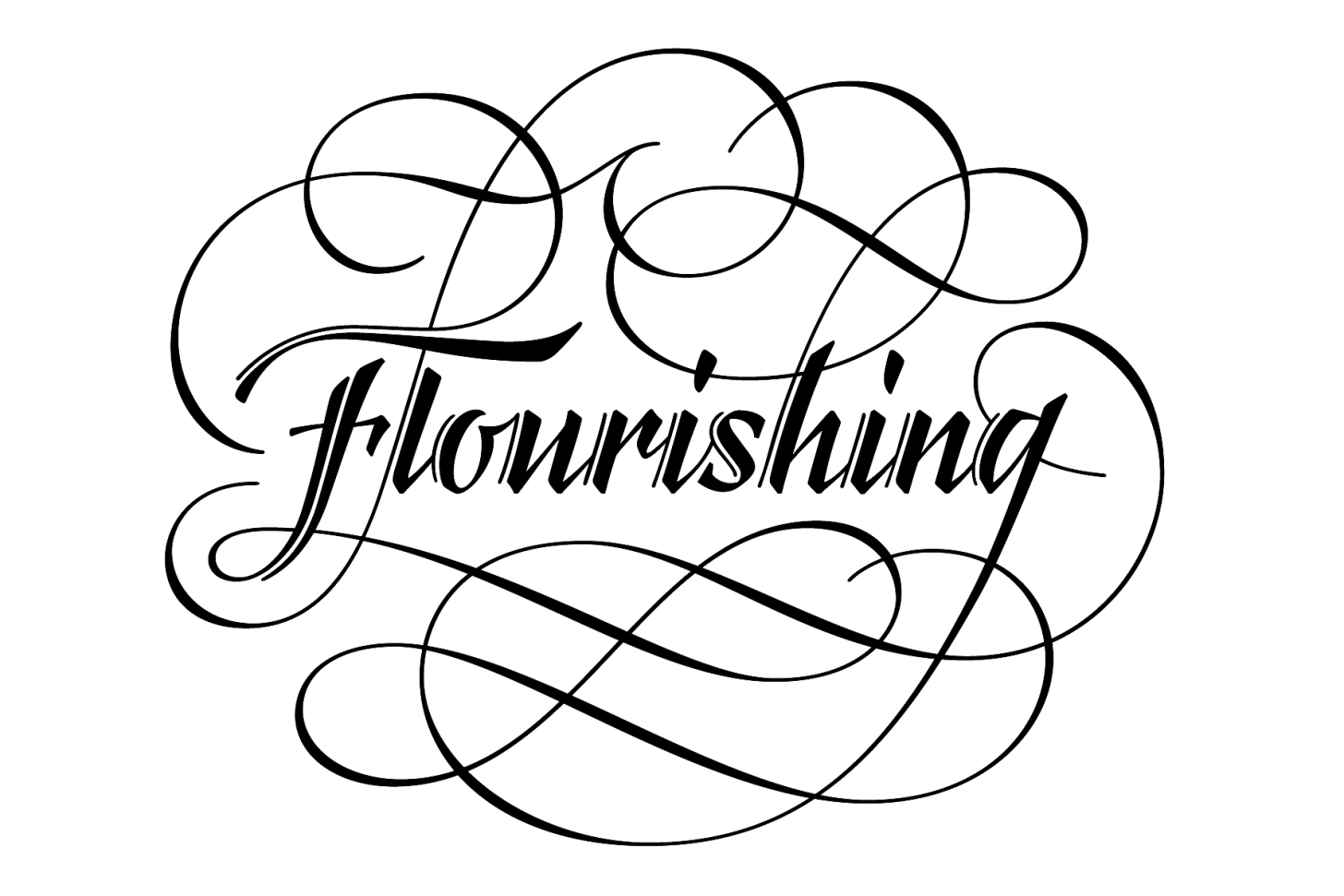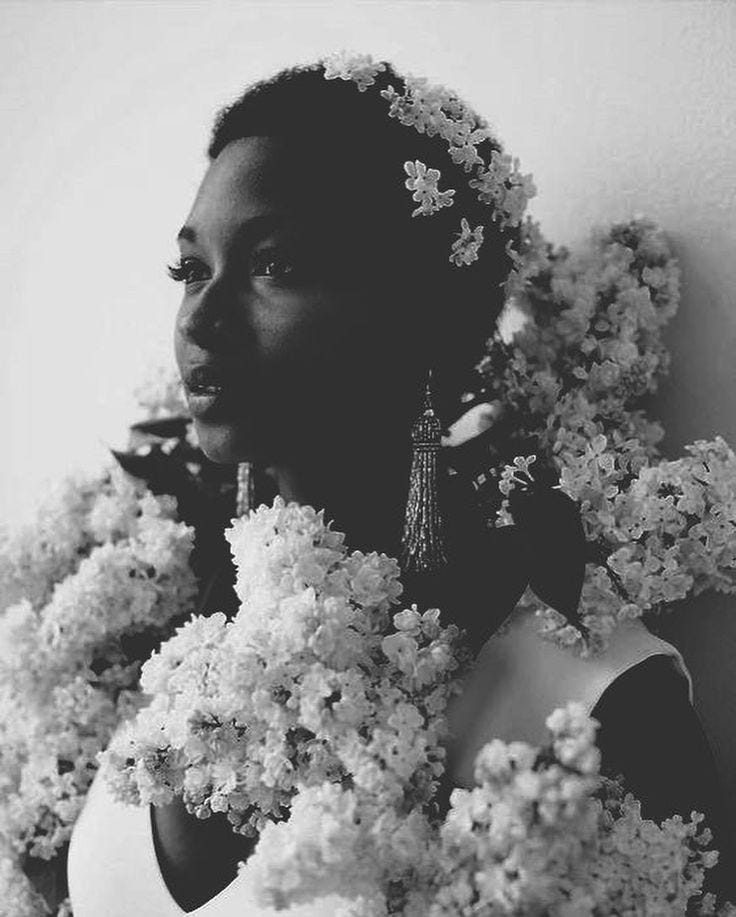Hello gentle-people,
The Woven series has a new home! Now you can go to agentlelanding.substack.com and see it as one of the menu options at the top. Also I keep forgetting to share this survey I created to get feedback on the series. If you find a little time and want to let me know your thoughts on it so far, please feel free to share. I would greatly appreciate it!
I am intentionally pausing the Woven series to share some thoughts on flourishing I’ve been sitting with. The threads have been coming together for a long time, but they finally feel ready to share.
Also I am still giving away comp subscriptions! Find out more here:
Adding the Flourishes
I have always been flourishing in the margins…of my notebooks, drawing swirls and lines in intricate patterns while I zoned out in class. A flourish in calligraphy represents the parts of the script that go beyond the basic letterform in decorative ways. They are the added bells and whistles that take the letters into shapes that often make them harder to read. Even as someone who is into it, I sometimes find myself struggling to read through flourished script.
Early on in my journey with this artform, I would have thought all of calligraphy was flourishing. In our modern world where they no longer teach cursive in school, any form of connected letters in handwriting feels a little extra. Flourishes have taught me that I have a lot to learn about the craft.

Though flourishing adds beauty, it can often diminish clarity. Often the unembellished letterform is called the “functional script,” distinguished in being readable and efficient. Sometimes they call the unadorned script the “skeleton of the letter,” which brings a whole new meaning to the term “bare bones.”
There is something about adding the flourishes that move beyond function. It is lines circling back on themselves, demanding to be noticed, inviting you to linger on them just a little longer.
Beyond Bare Bones
Budgeting used to be hard when I was barely making enough to make ends meet. Now my budget reflects that I am making ends meet and saving for a few different goals. I am enjoying using the app YNAB which stands for “You Need a Budget.” I have tried many budgeting tools with very little success until YNAB. Perhaps because their philosophy of “spendfulness” resonates with me, since it’s not so much about spending less but spending well.
One of my favorite features is the ability to create different filters in my budget so I can only view a few lines at a time. I have a filter that lets me see the most important categories I need to fund every time I get paid—rent and groceries, for example. These are the things I would need to have money for on a bare bones budget. It is a beautiful feeling to add money to these categories then uncheck the filter to see the other categories that represent my flourishes—the things that add roundness to my life. The things that help me add “surround these bones with flesh,”1 to borrow from Lucille Clifton.
At this point in my financial journey, I feel I have a sense of agency I’ve never felt before. I don’t make a lot of money but I am aware of my finances in ways that helps me to know where I am at. Money doesn’t scare me as much as it used to. I am no longer holding my breath when I swipe my card.
This is a form of flourishing too, shaped not by the amount of money I have but the time I have taken to learn how to be a better steward of my finances.2
A Maasai Adornment
I fulfilled a dream when I got my hair done in Mozambique in 2016. I got Maasai twists, which as a technique is a whole marvel. My hair was done by two Maasai men from Tanzania. They are known for their high skill in hair dressing and many have adapted their traditional hairstyles into modern hairstyles and techniques for women. This practice, of Maasai men braiding women’s hair is actually breaking a taboo, since this is a derivative of a style traditional hairstyles worn by men in their culture. As they braided my hair, I learned that their families were in Tanzania. They traveled to find work doing hair to send money home.
After four hours of work,3 the two men were done with my hair and getting ready to leave. But not before what seemed to be a small moment of disagreement between them. One of them wanted to get going since my hair was all done. But the other man paused to grab a few strands of twisted hair from just above my ears and twist them together at the top of my head. It looked like a headband made with my own hair.
I recall this memory because the extra time he took to braid my hair into an adornment has lingered with me. Especially after learning about the culture of the Maasai4 and the current state that leads many of the men to become hairdressers.5
Flourishing can look like deciding not to be done before adding a little flare. My hair in that moment was the result of someone’s moment of flourishing.
(Reading) Flourishing with Queer Eyes
I will keep this last vignette short. Only because it needs so little explanation. I have been watching the show Queer Eye in the last few weeks. It is a show I have struggled to watch because I was afraid of how it would move me emotionally. I felt called back to it recently, ready to let myself feel my feelings.
The way these transformations move me.
One of the things I have noticed is how often the makeovers honor who the person is at their core. One example is in Tan France’s role as the fashion expert on the show. So often, standing in clothes that fit better and feel better, the recipients under his care will say “this still feels like me.”
Very often the people who get made over are caregivers in some capacity. They have poured themselves into that role in such a way that they’ve let go of themselves. The Fab Five come in, with an eye for flourishing, and add touches of care and tenderness to their harsh realities. Queer Eye says everyone deserves a little beauty, especially in the form of tending to ourselves with a little extra attention.

Flourishing Through Survival
For awhile, I thought flourishing was something I could only dream of beyond survival. But my perspective has shifted. I now see flourishing as a part of survival.
Stay with me here—this isn’t a “shift your mindset and there’s no such thing as poverty” post. I know there are material realities we can’t ignore, fatigue we can’t forget and violences we can’t soften. I know there is a kind of flourishing we must strive for that means the end of poverty and hunger. I know there is a way pretty words, like the ones I write in calligraphy, can’t quite the ache that comes with not having enough.
The kind of flourishing I am thinking about is the kind that can exist in the place between desperation and relief. It reaches for softness and adds beauty beyond the functional (script). It slows down and inspires tenderness under pressure. It pauses to say “I’m not done yet,” adding a flare where others would be finished. It refuses to be straightforward, bending letters into curves with deep feeling. And yes, sometimes it refuses simplicity and with it, clarity.
The kind of flourishing I am thinking of often doesn’t make sense. In fact, it so often exists in places where some would struggle to make sense of it. The undiscerning eye might not even know what they’re looking at.
The Pace of Flourishing
Through exhaustion and with resistance, my enslaved ancestors found ways to stay human, making their own rhythm as they dragged their feet through the muck of madness. They moved slowly where they could, making sounds and songs that formed the foundations of today’s popular music. They practiced defiance where they could, finding ways to resist being property; ways to say “I am still mine.”
I know I am walking a tightrope in this post. I am trying to add the flourishes where it would be simpler to embrace a definition of the word that focuses on the absence of struggle. But what if I never get to that life?6 Is flourishing still mine to claim?
I have decided that it is. The roundness and beauty that comes with flourishing is not the reward for surviving, it’s the technique for doing so. Survival mode is not our inheritance7—flourishing is.
I choose to move at the pace of flourishing8 wherever I have the agency to do so. I don’t want a flourishing that is only legible within systems that leave those of us who will never get a makeover out of their stories of success. In this life I am making, I want a flourishing that finds me in the struggle and helps me to stay whole. Because I’m not done yet.
Landing Tracks
Would you say that you are flourishing? If so, what does it look like? If not, can you dream a way into flourishing that honors your agency?
Some might say “if flourishing isn’t essential, why does it matter?” What do you say to that? What has flourishing brought into your life?
Where do you see glimpses of flourishing around you? In people you love? In nature? In a book you read or a piece of music you listened to? How do they inspire you to flourish?
What does it take to flourish in a world that is resistant to slowness? That’s it. That’s the question. Take as long as you need to answer it or don’t answer. Maybe this is a question that should be felt as you live your life.
This is from one of my favorite poems of hers, “night vision,” which you can read here.
This was the trickiest section of this post for me, it felt like the finest line to walk.
Which is incredibly short for how small they were.
Heres a video that talks about the Maasai and a similar ethnic group, the Samburu. It goes into the importance their hair braiding and adornment practices and how it fits into the journey of their lives.
Hold your prosperity gospel.
Hold your toxic positivity.
Hold your naiveté.
I have been working to name this since I wrote the “Survival Mode is Not Our Inheritance” manifesto in May 2022, shared here July 2022:
I wrote something awhile back called “At Your Leisure—Moving at the Pace of Flourishing.” You might want to read that next in case you want to linger on the idea of flourishing as a pace rather than a place in life.








Whew Rose. I'm sitting with this as it is shifting something in me. Maybe I'll come back with a thought out comment, maybe I'll write about, maybe I'll just tell you directly...but wow. Thank you for this, friend.
I have *never* been able to successfully budget. It comes unraveled so quickly that it is discouraging to me. I can budget for others, even organizations very well. Me? no. Perhaps I need to gently look at the concept again. Poverty damages to the inner person and I think budgeting triggers that. Perhaps this concept you're bringing up could gently lead me to it